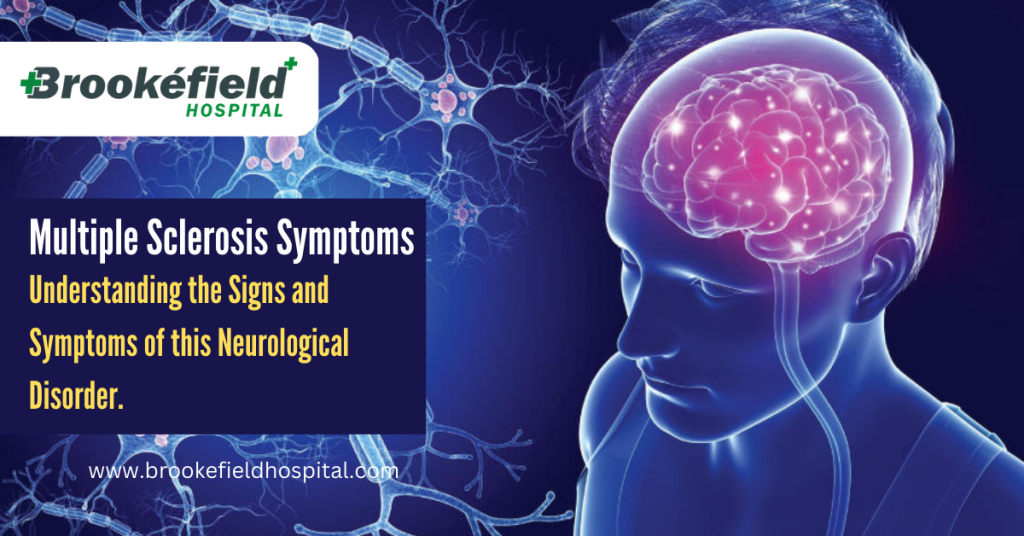Multiple Sclerosis Symptoms: Multiple Sclerosis (MS) is a chronic autoimmune disease that affects the central nervous system, causing damage to the myelin sheath that covers nerve fibers in the brain and spinal cord. This can lead to a range of symptoms that vary in severity and can impact a person’s ability to carry out everyday tasks.
In this article, we will explore Multiple Sclerosis Symptoms and provide tips on managing the condition.
What is Multiple Sclerosis?
Multiple Sclerosis (MS) is a chronic neurological disease that affects the central nervous system. It is caused by the body’s immune system mistakenly attacking the myelin sheath that covers nerve fibers in the brain and spinal cord. This can cause inflammation and damage, which can lead to a range of symptoms, such as:
Multiple Sclerosis Symptoms
- Fatigue
- Numbness or tingling in the limbs
- Muscle weakness or spasticity
- Blurred vision
- Loss of balance or coordination
- Difficulty with speech or swallowing
- Cognitive impairment
- Mood changes, including depression and anxiety
Types of Multiple Sclerosis
There are several types of Multiple Sclerosis, including:
- Relapsing-Remitting MS: The most common type of MS, characterized by episodes of symptoms (relapses) followed by periods of remission.
- Secondary Progressive MS: This type of MS occurs when relapsing-remitting MS transitions to a more progressive form.
- Primary Progressive MS: This type of MS is characterized by a gradual onset of symptoms that worsen over time.
- Progressive-Relapsing MS: This type of MS is rare and is characterized by a steady progression of symptoms with occasional relapses.
Causes of Multiple Sclerosis
The exact cause of Multiple Sclerosis is unknown, but it is believed to be a combination of genetic and environmental factors. Some of the factors that may contribute to the development of MS include:
- Genetics: MS is more common in people with a family history of the condition.
- Environmental Factors: Certain environmental factors, such as exposure to certain viruses or toxins, may increase the risk of developing MS.
- Autoimmune Disorder: MS is considered an autoimmune disorder, which means the body’s immune system mistakenly attacks healthy cells.
Diagnosis and Treatment of Multiple Sclerosis
Diagnosing Multiple Sclerosis can be challenging, as the symptoms can vary widely and mimic other conditions. Doctors may use a combination of tests, such as magnetic resonance imaging (MRI) and spinal tap, to diagnose MS. Once diagnosed, there are several treatment options available, including:
- Medications: There are several medications available that can help manage the symptoms of MS and slow the progression of the disease.
- Rehabilitation: Physical therapy and occupational therapy can help individuals with MS maintain their independence and improve their quality of life.
- Lifestyle Changes: Making lifestyle changes, such as eating a healthy diet, exercising regularly, and getting enough rest, can help manage the symptoms of MS.
Choose Brookefield Hospital
If you are looking for multiple sclerosis treatment in Bangalore, Brookefield Hospital is a good choice. Brookefield Hospital is a multispeciality hospital located in Bangalore. They have a dedicated department for neurology and neurosurgery, which includes experienced doctors and staff who specialize in treating multiple sclerosis.
Multiple sclerosis is a chronic disease that affects the nervous system and requires specialized care from medical professionals. The team at Brookefield Hospital is equipped with the latest technology and treatments to provide comprehensive care for patients with multiple sclerosis. They also have a team of rehabilitation specialists to help patients manage the symptoms of the disease and improve their quality of life.
In addition to its expertise in multiple sclerosis treatment, Brookefield Hospital also offers a range of other medical services, including cardiology, gastroenterology, orthopedics, and more. They have state-of-the-art facilities and use the latest medical technology to provide high-quality care to their patients.
Overall, if you are looking for a hospital in Bangalore for multiple sclerosis treatment, Brookefield Hospital is a good choice. It’s always important to do your own research and consult with your doctor to determine the best treatment plan for your individual needs.
Coping with Multiple Sclerosis
Coping with Multiple Sclerosis can be challenging, but several strategies can help. These include:
- Seeking Support: Joining a support group or talking to a counselor can help individuals with MS manage their emotions and cope with the challenges of the condition.
- Managing Stress: Stress can exacerbate the symptoms of MS, so it is important to find ways to manage stress, such as practicing relaxation techniques or taking up a hobby.
- Taking Care of Yourself: Eating a healthy diet, getting enough rest, and avoiding triggers that can worsen symptoms can help individuals with MS manage their condition.
FAQs: Multiple Sclerosis Symptoms
1. Can MS be cured?
No, there is currently no cure for Multiple Sclerosis, but there are several treatments available that can help manage the symptoms of the disease.
2. What causes Multiple Sclerosis?
The exact cause of Multiple Sclerosis is unknown, but it is believed to be a combination of genetic and environmental factors.
3. What are the early signs of Multiple Sclerosis?
Some of the early signs of Multiple Sclerosis include fatigue, numbness or tingling in the limbs, muscle weakness or spasticity, and blurred vision.
4. Is Multiple Sclerosis Fatal?
While Multiple Sclerosis is a chronic condition, it is not typically fatal. However, the disease can have a significant impact on a person’s quality of life.
5. How is Multiple Sclerosis Diagnosed?
Diagnosing Multiple Sclerosis can be challenging, but doctors may use a combination of tests, such as magnetic resonance imaging (MRI) and spinal tap, to make a diagnosis.
Conclusion: Multiple Sclerosis Symptoms
Multiple Sclerosis is a chronic autoimmune disease that can have a significant impact on a person’s quality of life. Understanding the signs and symptoms of the condition is crucial for early diagnosis and effective management. By seeking support, making lifestyle changes, and following a treatment plan, individuals with MS can manage their symptoms and improve their quality of life.
Also, Read This:




